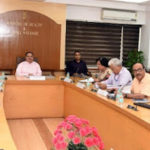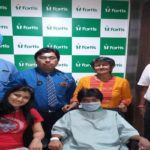“Research published in Heliyon finds that Facebook users who engage in social comparison are more aware of their physical ailments”
London, January 09, 2019:
As social networking activity has become pervasive, researchers have been taking a closer look at its impact on our psychological and physical health. A new study published in the journal Heliyon examines how Facebook users interpret the information they derive from social comparisons and how this process correlates with their perceptions of physical health. The results show that Facebook use and social comparison are associated with a greater awareness of physical ailments.
“More people are spending more time on Facebook and social comparisons are an inevitable part of the experience. It is important to be more aware of how this activity affects us, and how it may change how we feel about ourselves, given the strong link between well-being, quality of life, and physical health,” explained lead investigator, Bridget Dibb, PhD, School of Psychology, University of Surrey, Guildford, Surrey, UK. “Our study is the first to focus on the relationship between the interpretation of social comparison information on social media sites and perceptions of physical symptoms. Our most important finding was that participants who feel Facebook is an important part of their lives also report more symptoms, linking social comparison activity with the perception of worse physical health. It is important to study this further as we are yet unclear as to whether comparisons while using Facebook lead to a greater perception of physical symptoms or whether those who already experience physical symptoms tend to compare themselves more on Facebook.”
Social comparison is a process through which we compare ourselves with others in order to evaluate ourselves. It is something that virtually everyone does, especially when feeling uncertainty. Upward comparison occurs when we compare with someone who we perceive as “better-off” than ourselves, and downward comparison occurs when we compare with someone we feel is “worse-off” than ourselves. Social comparison via social media is typically upward because people tend to post their most attractive photographs and write about their good news.
While one might predict that upward comparison would shake a comparer’s confidence and downward comparison would boost it, the impact is not that consistent and straightforward. Previous research has shown that the experience after social comparison depends more on how the comparer interprets the information rather than on the direction of the comparison.
Dr. Dibb recruited 165 participants through Facebook with a mean age of 31.4 years (range 18-70). Two thirds of the group were female. Eight out of ten participants identified their ethnicity as European, 5.5 percent Asian, 9.7 percent African, 3.6 percent mixed race, and 12 did not distinguish ethnicity. Over half the group had at least 400 Facebook friends.
The participants completed an electronic questionnaire that used a cross-sectional design measuring Facebook use, Facebook social comparison, self-esteem, depression, anxiety, life satisfaction, and physical health. The mean self-esteem score of the participants was higher than average. More people agreed with the positively interpreted comparison statements than with the negatively interpreted comparison statements. In addition, more agreement was evident with positively interpreted upward comparison followed by positively interpreted downward comparison and negatively interpreted upward comparison, with negatively interpreted downward comparison experienced the least.
After controlling for demographic and psychosocial variables, only upward comparison demonstrates a significant relationship and, in particular, only positively interpreted upward comparison was correlated with more physical symptoms. This means that people who had positive feelings after comparisons with Facebook friends who are better off also reported a heightened awareness of health problems. Neither positive and negative downward comparison nor upward negative comparison were significantly associated with physical symptoms. Finally, Facebook use also had a positive significant relationship with physical symptoms, meaning that individuals who feel more strongly that Facebook is part of their lives also perceived more physical symptoms.
Dr. Dibb explained that this study doesn’t answer the question of whether the social comparisons precipitated the negative physical symptoms or that already ailing users make more use of Facebook. “We are still learning about the positive and negative effects of social media use, and causality is an important area for further study,” she noted.







